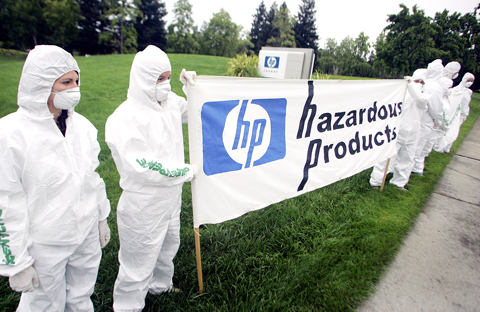Activists from environmental group Greenpeace have targeted Hewlett-Packard, painting a slogan on the company’s headquarters accusing the firm of using toxic materials in its products.
About 13 activists clambered onto HP’s Palo Alto premises before using paint rollers to daub the message “Hazardous Products” on the roof, Greenpeace spokesman Daniel Kessler said.
The stunt was designed to draw attention to HP’s purported use of toxic chemicals such as PVC plastic and flame retardants, Kessler said.

PHOTO: AFP
“The long and short of it is that HP said that by 2007 they would phase out use of these toxic-chemicals; they then backtracked and said it would be 2011,” Kessler said. “We used this event to communicate that is unacceptable.”
Greenpeace also used Star Trek actor William Shatner’s voice on a robocall targeting workers at HP to protest the firm’s alleged use of the chemicals, Kessler said.
HP said in a statement the company was committed to eliminating use of all brominated flame retardant/PVC from its PC products by the end of 2011.
“The unconstructive antics at HP’s headquarters today did nothing to advance the goals that all who care about the environment share,” the company said in its statement.

AGING: As of last month, people aged 65 or older accounted for 20.06 percent of the total population and the number of couples who got married fell by 18,685 from 2024 Taiwan has surpassed South Korea as the country least willing to have children, with an annual crude birthrate of 4.62 per 1,000 people, Ministry of the Interior data showed yesterday. The nation was previously ranked the second-lowest country in terms of total fertility rate, or the average number of children a woman has in her lifetime. However, South Korea’s fertility rate began to recover from 2023, with total fertility rate rising from 0.72 and estimated to reach 0.82 to 0.85 by last year, and the crude birthrate projected at 6.7 per 1,000 people. Japan’s crude birthrate was projected to fall below six,

Conflict with Taiwan could leave China with “massive economic disruption, catastrophic military losses, significant social unrest, and devastating sanctions,” a US think tank said in a report released on Monday. The German Marshall Fund released a report titled If China Attacks Taiwan: The Consequences for China of “Minor Conflict” and “Major War” Scenarios. The report details the “massive” economic, military, social and international costs to China in the event of a minor conflict or major war with Taiwan, estimating that the Chinese People’s Liberation Army (PLA) could sustain losses of more than half of its active-duty ground forces, including 100,000 troops. Understanding Chinese

US President Donald Trump in an interview with the New York Times published on Thursday said that “it’s up to” Chinese President Xi Jinping (習近平) what China does on Taiwan, but that he would be “very unhappy” with a change in the “status quo.” “He [Xi] considers it to be a part of China, and that’s up to him what he’s going to be doing, but I’ve expressed to him that I would be very unhappy if he did that, and I don’t think he’ll do that. I hope he doesn’t do that,” Trump said. Trump made the comments in the context

SELF-DEFENSE: Tokyo has accelerated its spending goal and its defense minister said the nation needs to discuss whether it should develop nuclear-powered submarines China is ramping up objections to what it sees as Japan’s desire to acquire nuclear weapons, despite Tokyo’s longstanding renunciation of such arms, deepening another fissure in the two neighbors’ increasingly tense ties. In what appears to be a concerted effort, China’s foreign and defense ministries issued statements on Thursday condemning alleged remilitarism efforts by Tokyo. The remarks came as two of the country’s top think tanks jointly issued a 29-page report framing actions by “right-wing forces” in Japan as posing a “serious threat” to world peace. While that report did not define “right-wing forces,” the Chinese Ministry of Foreign Affairs was